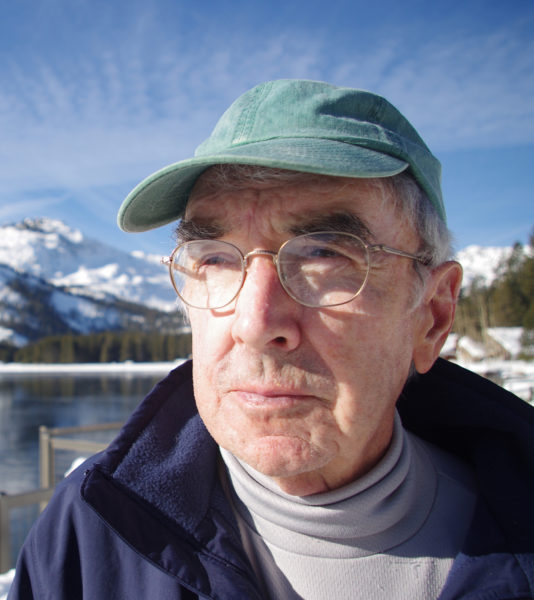
James Strohn Woodard, of Boothbay, died peacefully in his sleep Wednesday, April 24, his 81st birthday, from complications related to Parkinson’s disease, with which he’d been recently diagnosed.
A lifelong lover of words, he read, wrote, and taught high school and college students to do both better when he wasn’t tacking the shores of Boothbay and Bristol in his small sloop, slaloming down one or another of Maine’s mountains, or enjoying the camaraderie of friends, family, and neighbors. Strohn was thoughtful, kind, and unassuming. His world was small by design but full of warmth and intellectual stimulation.
He was born in 1943 in Los Angeles, the firstborn child of John Sloan Woodard and the former Mary Patricia Shields, of Butte, Mont. His grandfather, James Edward Woodard, had accumulated a small fortune as banker to the unscrupulous “copper kings” and later vice president for the treasury of Anaconda Copper. When Strohn was 7 his father – an engineer, inventor, aviator, and tavern owner – consumed his share of the inheritance by buying the distressed Donner Ski Ranch perched at the summit of the Donner Pass, 500 miles north and 8,000 feet above L.A. For six years the family lived in the lodge where his dad kept bar, and later a house he built next door, where the snowbanks would reach Strohn’s second story bedroom window. There Strohn developed a lifelong passion for skiing and attended Donner Trail Elementary and Truckee Junior High School, the latter requiring a school bus ride down the harrowing switchbacks of old U.S. 40 to Donner Lake, where the famous party of the same name met disaster.
In 1956 the family relocated to Wilton, Conn., which teenage Strohn most appreciated for the rail connections to Manhattan that allowed him to see plays, classical concerts, and museum collections unavailable in the harsh mountains passes of the Sierra Nevadas. After graduation from Wilton High School he moved to Maine to attend Colby College. In his junior year, he crisscrossed the Atlantic at the twilight of the passenger liner era to study in Paris. He later earned a master’s degree in English at Syracuse University.
At Colby Strohn met Karen Andersen, daughter of the East Boothbay ceramicists Weston and Brenda Andersen, who he married in 1966. They had one son, Colin, but the marriage ended in 1974, at which point he moved to the Boothbay peninsula, buying the Back Narrows Cove home where he would spend the rest of his life.
The Andersens had introduced him to what would be his second lifelong passion, sailing. Around 1970 he bought an 1896 Herreshoff 31-foot sloop, falling in love with its elegant lines and careful craftsmanship, then out of love with its rotting hull and comically unreliable inboard engine. His second boat, a 21-foot Pearson Ensign, had similar lines but a more practical fiberglass hull and would remain his constant companion on the Damariscotta River – and occasional, camping-style cruises with Colin further Downeast – for nearly 40 years.
He also loved the written word. He read extensively, wrote a great many short stories and at least one unpublished novel set in the chaos of contemporary Haiti, which compelled him in his ‘60s to fly, alone, to the Dominican Republic, where he took a bus to the border and tried unsuccessfully to convince Haitian border guards to let him cross and explore the unstable land beyond. But mostly he taught: at the old Bristol High School and Coburn Academy in the late 1960s, Boothbay Regional High School in the 1980s, and as the longest continuously serving adjunct professor in the history of the University of Maine at Augusta, where he taught English literature and composition from 1990 until his retirement in 2019.
He was in large part a creature of habit, enjoying the regularity of comfortable patterns: afternoon sails in the warm months, weekend skiing in the colder ones; cocktails, dinner, and chablis with friends and neighbors at the Thistle Inn and Carriage House in their respective heydays and at the nearby homes of his many friends; an annual trip to visit some of those same friends at their second homes in the Caribbean or Europe; and sojourns to Manhattan to keep up with the goings on at the theaters, museums, and concert halls of his youth. He cared little about clothes or home decor and drove ancient Volvo wagons, but appreciated a certain sort of tastefulness: a witty New Yorker cartoon, the cerebral aesthetic of “All Things Considered” or Robin MacNeil and Jim Lehrer’s News Hour, Nathaniel Herreshoff’s overhanging bows and sterns, Vivaldi’s concertos, the craftsmanship of his grandfather’s gold pocket watch.
In February 2022, at age 79, Strohn returned to the Donner Ski Ranch for the first time, skied down from the summit with his son and grandson, and spent hours in conversation with a man a dozen years his senior who’d worked for and bought the resort from his father, sharing memories of people and events nobody else alive could have. A friend later asked him about his bucket list. “I’ve already completed it,” he said cheerfully. “It was Donner.”
He is survived by his son, Colin Strohn Woodard and wife, Sarah; grandchildren, Henry and Sadie Woodard; nieces, Cally Lilley and Chelsea Woodard; and nephew, Dawson Woodard; and Dana Moses, friend and neighbor of more than half a century. He was predeceased by his younger brothers, David Waite Woodard, in 1964, and Michael Stephen Woodard, with whom he shared a birthday and much else besides, in 2021.
A memorial service will be held in the Boothbay area in the coming weeks.






